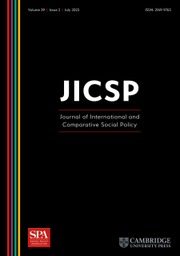Crossref Citations
This article has been cited by the following publications. This list is generated based on data provided by
Crossref.
Pawar, Manohar
2019.
Further Comment on Ideas Old and New: Bharatiyakaran/Indianisation of Social Work.
The International Journal of Community and Social Development,
Vol. 1,
Issue. 3,
p.
264.
Mor Barak, Michàlle E.
2019.
Social Good Science and Practice: A New Framework for Organizational and Managerial Research in Human Service Organizations.
Human Service Organizations: Management, Leadership & Governance,
Vol. 43,
Issue. 4,
p.
314.
Delwit, Pascal
2019.
La-N-VA et les élections d’octobre 2018 : des aspirations contrariées.
Les Cahiers du Cevipol,
Vol. N° 2,
Issue. 2,
p.
3.
Pawar, Manohar
2019.
Editorial.
The International Journal of Community and Social Development,
Vol. 1,
Issue. 1,
p.
9.
Bartha, Attila
Boda, Zsolt
and
Szikra, Dorottya
2020.
When Populist Leaders Govern: Conceptualising Populism in Policy Making.
Politics and Governance,
Vol. 8,
Issue. 3,
p.
71.
Flores‐González, Rubén
Andrade del Cid, Patricia
Ávalos‐Rivera, Alexia R.
and
Torio‐Hernández, Mónica
2021.
The populist trinity of communication, ideology, and strategy: A proposal to enhance the analysis of populist discourses.
Latin American Policy,
Vol. 12,
Issue. 2,
p.
333.
Ennser-Jedenastik, Laurenz
2022.
The impact of radical right parties on family benefits.
West European Politics,
Vol. 45,
Issue. 1,
p.
154.
Kazanoğlu, Nazlı
and
Ketola, Markus
2022.
Understanding the moral economy of state-civil society relationships: Islam, women’s NGOs and rights-based advocacy in Turkey.
Turkish Studies,
Vol. 23,
Issue. 4,
p.
600.
Vlandas, Tim
and
Halikiopoulou, Daphne
2022.
Welfare state policies and far right party support: moderating ‘insecurity effects' among different social groups.
West European Politics,
Vol. 45,
Issue. 1,
p.
24.
Meardi, Guglielmo
and
Guardiancich, Igor
2022.
Back to the familialist future: the rise of social policy for ruling populist radical right parties in Italy and Poland.
West European Politics,
Vol. 45,
Issue. 1,
p.
129.
Pawar, Manohar
and
Anscombe, A . W.
2022.
Enlightening Professional Supervision in Social Work.
p.
27.
Woods, Dwayne
2022.
A Boat Load Too Many: How the League Uses Global Migration.
Chinese Political Science Review,
Vol. 7,
Issue. 2,
p.
305.
Ketola, Markus
and
Odmalm, Pontus
2023.
Political Communication and Performative Leadership.
p.
163.
Wiß, Tobias
and
Wohlgemuth, Felix
2023.
The politics of disaggregated family policy: The role of party ideology and women's political representation in governments.
Social Policy & Administration,
Vol. 57,
Issue. 7,
p.
1117.
Bell, David Andreas
Valenta, Marko
and
Strabac, Zan
2023.
Nordic welfare chauvinism: A comparative study of welfare chauvinism in Sweden, Norway and Finland.
International Social Work,
Vol. 66,
Issue. 6,
p.
1786.
Burmeister-Rudolph, Mira
2023.
A transnational social contract: Social protection policies toward Non-Resident Keralites.
Migration Studies,
Vol. 11,
Issue. 2,
p.
286.
Friedman, Rachel Z.
and
Iversen, Torben
2024.
Probabilistic justice against status defense: inequality, uncertainty, and the future of the welfare state.
Theory and Society,
Vol. 53,
Issue. 4,
p.
829.
Yusupova, Guzel
and
Matveev, Ilia
2024.
Nationalism and Inequality Scholarship in the Age of Populism: Bringing Territory Back In?.
Nationalities Papers,
Vol. 52,
Issue. 2,
p.
237.
Leruth, Benjamin
Taylor-Gooby, Peter
and
Győry, Adrienn
2024.
Categorizing discourses of welfare chauvinism: Temporal, selective, functional and cultural dimensions.
Journal of European Social Policy,
Vol. 34,
Issue. 2,
p.
128.
Lee, Jaewook
2024.
Economic Insecurity and the Rise of Anti-Immigrant Sentiments: The Role of Labor Market Risks and Welfare Deservingness Perception.
Political Studies Review,
Vol. 22,
Issue. 4,
p.
871.


